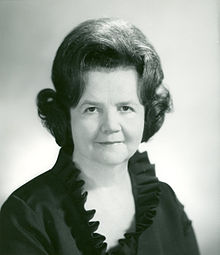Louise Day Hicks
| Louise Day Hicks | |
|---|---|
 |
|
| Member of the U.S. House of Representatives from Massachusetts's 9th district |
|
|
In office January 3, 1971 – January 3, 1973 |
|
| Preceded by | John W. McCormack |
| Succeeded by | Joe Moakley |
| President of the Boston City Council | |
|
In office 1976–1976 |
|
| Preceded by | Gerald O'Leary |
| Succeeded by | Joseph M. Tierney |
| Personal details | |
| Born |
Anna Louise Day October 16, 1916 Boston, Massachusetts |
| Died | October 21, 2003 (aged 87) Boston, Massachusetts |
| Resting place | Saint Joseph Cemetery, West Roxbury, Massachusetts |
| Political party | Democratic |
| Spouse(s) | John Hicks |
| Religion | Roman Catholic |
Anna Louise Day Hicks (October 16, 1916 – October 21, 2003) was an American politician and lawyer from Boston, Massachusetts, best known for her staunch opposition to desegregation in Boston public schools, and especially to court-ordered busing, in the 1960s and 1970s.
Hicks was the daughter of William J. Day and Anna (née McCarron) Day. Hicks described her father, a lawyer and an influential judge in Boston, as her "greatest influence". The child of poor Irish immigrants, William Day became one of the wealthiest men in South Boston as a result of his law practice, real estate investments and his role as director of South Boston's Mount Washington Cooperative Bank. Day was admired by Boston's Irish community: as a banker he provided assistance to families struggling to make mortgage payments and as a judge he was particularly lenient towards juvenile defendants. In her own political career, Hicks would benefit from her father's reputation.
Hicks' mother died when Hicks was only fourteen years of age. In 1942, she married John Hicks, an engineer, and they had two sons, John and William.
Hicks studied home economics at Simmons College and then later earned a teaching certificate at Wheelock College. She worked as a first grade teacher in Brookline, Massachusetts, for two years and pursued a degree in education at Boston University.
Hicks enrolled at Boston College Law School in 1949, but she left after two years without earning a degree. She entered law school a second time in 1952, this time at Boston University Law School. Hicks stated that her father's death in 1950 left her resolved to follow in his footsteps. At this time female law students were still rare; Hicks was one of only nine women in her class of 232. Hicks formed close friendships with two other female students, one Jewish and one black, and she studied for exams with a group made up of mostly minorities. Hicks graduated with a law degree in 1955 and opened a law office; Hicks and Day; with her brother John.
Hicks ran successfully for the Boston School Committee in 1961, presenting herself as a reform candidate. Although her own children attended parochial schools (private Catholic schools), her campaign slogan was "The only mother on the ballot". In January 1963, she became the committee chairperson and seemed likely to be endorsed by the leading reform group when, in June, the Boston chapter of the NAACP demanded "an immediate public acknowledgment of de facto segregation in the Boston public school system." At the time, 13 city schools were at least 90% black.
...
Wikipedia
